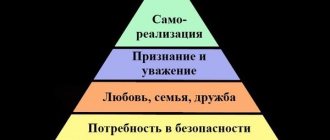A person’s spiritual needs, together with requests of a material nature, become, in fact, two sides of the same coin. As creatures belonging to the animal world, until the end of their days people remain hostage to physiology, which requires society to constantly replenish the material resources necessary for life. Humanity needs food, shelter, protection from the adversity of the weather. A lot of things are needed to make life safe and satisfying. Including things that, due to ignorance, a person is not yet aware of. But there is also an aesthetic side. As human practice has shown, starting with Adam and Eve, satisfying only biological needs for an individual from the homo sapiens tribe is not enough. Why? For a person who has reason, he also needs ideological conditioning of his actions. People need certain life guidelines that allow them to more comprehensively and rationally identify and, if possible, assimilate the benefits that guarantee optimal comfort.
Spirituality becomes this mediator. At least the most important of all achievable. It fills the individual’s consciousness with those guidelines that provide the opportunity to live better. They give everyone the same metaphorical Darwinian twig, with the help of which you can reach what was previously inaccessible. Filling the intellect with new knowledge, sensory images and applying all this in practice, a person improves his capabilities, understands their extent and thereby understands his surroundings and himself better and better.
What is considered to be the satisfaction of spiritual needs: examples
We can talk about the development of the inner world when a person strives for self-development, knowledge and achieving harmony. For example, imagine that someone works as a car mechanic. He is satisfied with his activities and earnings, but in his non-working hours he is interested in physics, plans to enter a university and wants to improve his competence in the field of interest to him in order to:
Ask a question
a) develop professionally; b) reveal your potential; c) expand your social circle, filling it with thinking people.
↑ Pyramid of needs by A. Maslow
Of the many different classifications of needs, the most popular is the hierarchical (
hierarchy is the placement of elements from lowest to highest) pyramid of psychologist Abraham Maslow.
PRIMARY (INGENATE) NEEDS
The first two stages are primary or congenital,
since if these needs are not satisfied, a person will not be able to engage in other activities, and all his aspirations will be aimed at realizing precisely these needs.
For example, if he is hungry, then all his thoughts, desires and actions will be about food. A person's life depends on it. Such needs include physiological
and
existential . Physiological needs
are essential for survival. These include the needs for food, water, respiration, shelter, rest and reproduction.
Existential
include needs for security and confidence in the future include needs for protection from physical and psychological dangers from the outside world and confidence that physiological needs will be satisfied in the future.
SECONDARY (ACQUIRED) NEEDS
All other needs A. Maslow defined as secondary or acquired.
Social
needs or needs for belonging and love, for social connections, affection, caring for another person and attention to oneself, participation in shared activities.
Prestigious
or, in other words, the need for self-esteem, evaluation or respect from other people, recognition, success and appreciation, career growth.
Prestige
is a measure of society’s recognition of a person’s merits.
Every person, to a greater or lesser extent, has a need for competition, a desire to stand out, to be better than someone else, and to be respected by others. Therefore, the desire to achieve a higher position in society, to enter prestigious, popular faculties, to make a career, to achieve prosperity - these are prestigious needs.
The following three types of needs (cognitive, aesthetic and spiritual) are the aspirations of the “soul” and are considered the highest human needs.
Cognitive needs
- this is a study of the surrounding world, reality in order to obtain new knowledge, impressions, and the desire for purposeful creative activity.
They are also called cognitive needs .
Aesthetic needs
- this is a person’s spiritual desire for harmony and beauty, art and creativity. Thanks to these needs, the world has theaters, exhibitions, museums, art galleries, ballet, music and dance.
At the topmost step are spiritual needs
or the need to realize one’s potential and grow as an individual
(self-development, self-improvement)
.
Realizing his needs, the individual builds his life in accordance with them.
The needs of lower levels require satisfaction and, therefore, influence human behavior before the needs of higher levels begin to affect motivation. At any given moment in time, a person will strive to satisfy the need that is more important or strong for him. Before the next level need becomes the most powerful determinant of human behavior, the lower level need must be satisfied.
«When the strongest and most priority needs are satisfied, the needs that follow them in the hierarchy arise and require satisfaction. When these needs are satisfied, a transition occurs to the next step in the ladder of factors that determine human behavior.
" Psychologists K. Hall and G. Lindsay
If basic needs are not realized, then they are replaced by pseudo-needs
, for example, the need for luxury goods, alcohol, gambling, etc.
One should remember about reasonable limitation of needs, since, firstly, not all human needs can be fully satisfied, and secondly, needs should not contradict the moral norms of society.
Reasonable needs
- these are the needs that help the development in a person of his truly human qualities: the desire for truth, beauty, knowledge, the desire to bring good to people, etc.
Imaginary needs
- artificially created by man, the implementation of which can be dispensed with (for example, smoking).
Since with the development of a person as an individual his potential capabilities expand, the need for self-expression can never be fully satisfied. Therefore, the process of motivating behavior through needs is endless.
A person experiencing hunger will first seek to find food, and only after eating will he try to build a shelter. Living in comfort and security, a person will first be motivated to activity by the need for social contacts, and then will begin to actively strive for respect from others. Only after a person feels inner satisfaction and respect from others will his most important needs begin to grow in accordance with his potential. But if the situation changes radically, then the most important needs can change dramatically. Needs underlie the emergence of interests and inclinations.
How human spiritual needs are formed: ideal conditions
The formation is influenced by several factors:
- Upbringing. It is in the family that the child first receives certain ideas about personal and social values and norms.
- Socialization. Society has a huge impact on the development of personality, the emergence of various desires and attitudes.
- Mental and physical condition. The aspirations of a sick individual differ markedly from those of a healthy person. In addition, there are people who, due to the peculiarities of the development of intelligence, do not need to comprehend the sphere of ideals.
- Education. People spend a significant part of their lives in educational institutions, so their influence is also great.
- Work activity and colleagues. An adult is mostly influenced by the team in which he works, as well as the work itself, to which he devotes a huge amount of time every day.
Hierarchy of values
Each person's hierarchy of values has its own characteristics. Each life value in such a hierarchy takes its place depending on the degree of its significance for the individual.
If we summarize the results of numerous studies, we can determine the following common hierarchical sequence of life values
:
- family;
- children;
- health;
- career;
- money;
- self-realization;
- Friends;
- entertainment;
- public acceptance.
Thus, basic personal and family values are at the top of the hierarchy, and material and other values are at the very bottom.
Kinds
The realm of “spirit” can be divided into two categories. The first includes everything related to the disclosure of a person’s inner potential:
- The desire for contemplation and familiarization with beauty, acquaintance with the works of masters and creators, appreciation of works of art.
- Scientific and educational activities, expanding the boundaries of worldview.
- Taking care of physical health without visible problems with it.
The second is what relates to its implementation in society:
Role
Components of personality
Values are an integral part of personality
person.
If a person tends to love his family, strive for career success, and engage in spiritual development, then other people can use knowledge about his values when characterizing his personality.
Love for family
characterizes a person as responsible, loving and caring.
Career success
speaks of discipline and determination.
The desire for spiritual development
indicates high morality and intelligence.
Prerequisites for behavior
At the same time, values are also the motivation of human behavior.
If a person’s own health occupies a priority place among life values, then all his behavior will be aimed at observing this value - maintaining a correct lifestyle
, constant monitoring of your health, avoiding situations dangerous to the body, etc.
If for a person kindness, decency and sincerity are integral elements of spiritual values, then meanness, betrayal, and lies cannot be expected from him.
The exception is cases when a person departs from his life goals under the influence of external factors: thirst for profit, avoidance of responsibility, etc.
In this case, it is possible to commit actions that contradict existing principles
.
Often the result obtained does not bring the expected satisfaction to a person due to the contradiction that has arisen between internal principles and committed actions.
Classification
Typically, human needs are often presented in the form of a pyramid, and at the very beginning, at the foot, physiological needs are located, and spiritual needs are located at the top of this very pyramid. These can easily include the result of self-expression in various fields of activity, from art, religion and science to sports. The need to communicate with other people who are completely different from yourself or who have the same character traits as you.
There is no person on planet Earth who would not like to assert himself in society, to earn honor, respect and admiration from as many people as possible. In addition to the above needs, it should be noted that there is a huge number of very diverse requests, which are explained by the complexity of not only natural, but also social conditions that people are accustomed to putting up with. It is very difficult to identify any special groups of needs; it is known that today there are about 120 of them.
What it is?
Needs , specific needs of a person or animal that must be satisfied to create a feeling of comfort, confidence, and tranquility.
Physiological needs are the support for all others, since their insufficient satisfaction undermines life.
According to the ideas of Abraham Maslow , physiological needs are followed by social ones: the need to communicate, to feel a sense of community, to be accepted by others, to be loved and protected. And only after them come the spiritual ones.
Spiritual needs, the highest needs of a person, which can be properly satisfied only if the needs of a lower level are satisfied at least relatively.
What are they? List of spiritual needs :
- need for cognitive activity,
- desire to improve oneself, develop,
- the need to have one or more favorite areas of activity,
- the need to understand the meaning of one’s own existence and clearly define life goals,
- the need to realize oneself in certain areas of activity, to become significant, to reveal one’s capabilities to the fullest,
- the need to receive aesthetic pleasure.
The main problems that prevent a person from realizing spiritual needs are dissatisfaction with lower needs, mental and physical illnesses.
Basic differences from physical needs
| Spiritual | Material |
| You can do without them. Existence itself will not be under threat, the problem will only be in its quality. | They are perceived as extremely necessary. |
| The priority is not obtaining benefits (although such a task may exist), but achieving internal satisfaction. | In the first place is the possession of certain goods. |
| The most important thing is mental harmony. | Aimed at providing the body with comfort and safety. |
| They are determined not by visible image and practical function, but by internal content. | The utilitarian orientation is primary. |
| Disobjectification of the results of cultural activities. | Objectification of cultural creations. |
| Durability of values: even after physical loss, memories remain of them. | Fragility: a thing has weight only when it is imprinted in a certain form, a shell. |
Maslow's theory
Maslow's theory of human needs was developed in 1943. An American psychologist distributed human needs in ascending order. He explained it this way: it is impossible to desire something highest if primary needs are not satisfied. The basis of the pyramid is physiological needs, such as the desire to satisfy hunger, thirst, and enter into sexual relations. Above them come security, affection and love, respect and approval, and knowledge.
Abraham Maslow's theory defines self-actualization as the highest need. Maslow clarifies that each person has an individual set of needs, some steps of the pyramid may change, and achieving 100% completion of each position is not necessary to move to the next level.
Signs
To distinguish between material, spiritual and social needs, you need to understand their nature. Material needs are interconnected with ensuring material existence. Without material wealth, it is impossible to imagine the full life of a modern person. Spiritual benefits are interconnected with the desire for creativity, communication, and love.
Social and spiritual needs are closely related. Social needs arise in the process of an individual’s life within society. Social needs form the basis of motivation for work and other activities and participate in the formation of behavioral models. In the sphere of correlation of spiritual and social needs, self-realization and self-affirmation of the individual are distinguished. Signs of spiritual ideal needs in comparison with material needs:
- Formation in consciousness.
- Relative degree of need (for example, in comparison with physiological needs - the need for air, water, food, clothing, shelter).
- A wide choice of means of achievement, ways of satisfaction.
- Satisfying spiritual needs usually only involves spending time.
- Unselfish connection between object and subject.
- The process of satisfying needs is not limited by boundaries.
Unmet physiological needs will lead to the physical death of the individual. The inability to satisfy spiritual needs affects the psychological state of the individual, leads to social maladjustment, and a decrease in the quality of life. For example, being unemployed is associated with a loss of confidence in oneself and one's future.
Rethinking
There are certain signs by which a person understands that his value system needs rethinking:
Thus, life values not only determine our behavior, but also guide our lives.
A clear understanding of your own life values is the key to satisfaction with your life and a full, successful existence in society.
What is the most important thing in life for you? And if you ask this question to different people, you will probably get different answers. I would immediately say freedom and development. One of my best friends replied that the most important things in life for him were family and health. You will have your answer. All you need to understand is that what is important to you controls your actions. Depending on what your priorities are, your life will be structured. And in this article I would like to talk about the formation of a system of life values, because... I think this is a very important point in the process
Ways to improve
As long as a person feels that there are a lot of closets with skeletons in his soul, he will not be able to enjoy even the most luxurious life in material terms. The need for self-knowledge is an ideal need, the satisfaction of which ensures peace and a positive state of mind.
It is a well-known fact in psychology: a person’s moral state is closely related to his self-esteem. Every person wants to feel special, unique, capable of doing what others cannot. This is not narcissism or bragging, but a normal necessity when it does not go beyond adequate limits.
Why is the value system so important for every person?
It is important to understand that the presence of a system of value orientations already indicates a mature personality. Personal values determine our internal readiness to perform certain activities and indicate the direction of our development. To put it in simpler words, the value system for a person is a certain vector of his development. The value world of every person is vast. However, there are certain “basic” values that determine activities in the main ones.
Life values do not arise overnight. They are the result of our life experiences. Significant events in our lives, books, films, teachers, etc. play a huge role in this. Life values can change over time. There is nothing more permanent than temporary. At 15 you have one set of values, at 30 you have different values. Each person's values are individual, like fingerprints. The coincidence of the main life values strengthens relationships between people, which is very important in modern society.
Understanding your main life values is a very important thing. If you live a long and difficult life, and at the end you understand that such a life was not interesting, then it will be too late to change anything... If, on the contrary, you know well what you want from life, what is truly for you dear, every day of your well-structured life will be filled with meaning.
Types of manifestation of spiritual need
Examples can be divided into 2 options:
- It is based on a collection of possible ways of spiritual development.
- Using accumulated knowledge in society.
First group:
- Performs observational activities on real and unreal characters in books, plays, films, and so on.
- Receiving aesthetic pleasure from nature, works of artists, music.
- Expanding the boundaries of development from scientific and educational activities.
- Health support for new exploits.
Second group:
- Promotes the materialization of spiritual needs through work activity.
- Comparison of your views in society with social norms.
- Patriotism of action, focusing on the protection and love of the fatherland on the part of man.
The process of implementing these requests is not linear. Usually their satisfaction goes in parallel with material needs and the inner world of a person.
Basic needs include the following:
Need to study
While satisfying desires for new knowledge, a person expands his horizons and becomes smarter. Thanks to an innate interest in the world around us, active steps are taken to study it. If this need is not satisfied, a person is in danger of withdrawing into himself.
Craving for self-improvement
It is expressed in the independent development of the mind and concern for one’s own development, the cultivation of good human qualities. An important point can be called awareness in intellectual development and determining one’s place in life. But it is also important that the path itself is considered volitional and depends on various factors, including lifestyle.
When improving yourself, you should always compare your current life with your past. Awareness of personal growth will have a beneficial effect on all other aspects of life. You will be confident in achieving your goals and confidently begin to look into the future. To make your self-improvement ideal, set clear, specific goals.
Important! Do not give in to uncertainty and fear, they will distance you from development. Just like never compare yourself to others. Your life is only your choice and desires, as well as the path to achieve them.
Favourite buisness
Thanks to doing what you love, you can recharge your energy, be inspired for new feats and express yourself as an individual. When achieving goals, a person turns first of all to the help of his physical and mental abilities. If a person gets a thrill from building his business, developing his creativity or any other activity, he will never stop doing it and will continue to develop it further.
Giving happiness and love
By bestowing your kindness on others and charging them with positive emotions, you receive a similar return of positivity and happiness in return. Everyone wants to feel needed, loved and in demand. During loneliness, people withdraw into themselves, begin to yearn and be sad, creating emptiness inside.
How to change your life for the better: 3 ways and 19 tips
Description
If spiritual needs are not met, a person does not die, his somatic health does not suffer, and in some cases this does not affect mental health, especially if the person has various congenital or acquired intellectual disabilities.
At the same time, most people still need to satisfy their spiritual needs to one degree or another. What needs can be called spiritual, what relates to them?
Cognitive activity
Even in the Stone Age and earlier, people sought to understand the world around them, tried to understand how what surrounded them worked, how certain phenomena could be explained.
Their conclusions led to the emergence of the first beliefs and superstitions, since the easiest way to explain the origin of phenomena that were common to modern people, but completely inexplicable to ancient phenomena (thunderstorms, fire, rain), was to associate them with the activities of otherworldly forces, gods, spirits, magic.
It is thanks to the desire for cognitive activity that humanity is at the current stage of development and continues to improve.
This need is closely related to other spiritual needs and is the key to achieving goals that are important to most people .
How to satisfy this need?
It is important for each person to find his own path to knowledge and determine which areas are most interesting to him.
For some, reading books and articles is suitable, for others, watching educational videos, visiting sections, clubs, courses.
In order for the information to be properly assimilated and useful, it is important to regularly use it to achieve practical goals and improve skills.
Self improvement
This need is closely related to the previous one, but not in all aspects, since self-improvement includes not only development associated with increasing the amount of knowledge and number of skills, but also intellectual (you cannot evaluate a person’s intelligence only by the amount of knowledge in memory, there are other criteria ), physical, moral.
Difference from material
Table of basic differences:
| Spiritual | Material |
| They feel like something that you can do without, except that your quality of life will partially suffer. | They feel necessary. |
| Rarely focused on obtaining benefits (there may be such a goal, but usually it does not come first), they are primarily needed by a person to achieve harmony, happiness, and deep satisfaction. | Getting benefits is usually a priority. |
| Aimed at achieving psychological comfort. | Focused on obtaining comfort for the body (clothing, food, housing, physical safety). |











